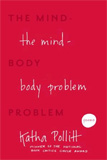Review by Cathleen Calbert
Random House
1745 Broadway
New York, NY 10019
IBSN 978-1-4000-6333-8
2009, 96 pp., $23.00
www.randomhouse.com
First of all, Katha Pollitt should win an award for one of the best titles in poetry this year. Who doesn’t want to read a book of poems entitled The Mind-Body Problem? Gee, I’m ready to hear a poetic solution to this . Of course, being a poet, she doesn’t give us one.
Personally, I wouldn’t mind getting into more of the messes of life with Pollitt; that is, I’d be eager to follow her explorations of the ways in which we are pulled along by the “swift and powerful dog” of the body. Instead, the poems in this collection, if not full of intellectual hi-jinks or fast-stepping experimentation, are, I would say, poems of the mind, verses of observation and reflection—that great ol’ Romantic combo.
In the title poem, which also serves as the title for the first of three sections and the opening poem, the speaker recalls that youthful life of the mind, or as a fellow poet once described it to me, that period when feckless intellectuals think of their bodies primarily as brain-stands. So too does the speaker in Pollitt’s poem reminisce with the humor and wistfulness of midlife about her earlier inattention to her pleasure-seeking corporeal form:
It seems
unfair, somehow, that my body had to suffer
because I, by which I mean my mind, was saddled
with certain unfortunate high-minded romantic notions
that made me tyrannize and patronize it
like a cruel medieval baron, or an ambitious
English-professor husband ashamed of his wife—
The conjunction of similes—medieval baron and ambitious English professor— seems to me especially charming. And telling. I believe Pollitt knows whereof her speaker speaks.
Overall, this seems to me the strength of her beautifully printed, wonderfully well-published, long-awaited second book of verse: the way that the poet notes our amusements and bemusements, especially regarding those ordinarily passed over experiences in life, in accessible, easy-going free verse.
Although the poems in the first section travel in both time and place—from summer outings to “nineteenth-century poetesses”—the second section, “After the Bible,” unsurprisingly focuses on Biblical revisioning and are enjoyable also but perhaps cover overly familiar ground: Martha, Lot’s wife, the expulsion from Paradise.
The third, section, “Lunaria,” returns to the concerns explored in the first, with an added leitmotif of, well, light. Although happiness, pure and simple, “Writes White” and is therefore undesirable, these poems look for and find more complex joys, perhaps because they remember to note the little losses of midlife, as in the list of disappearing words at the end of “Shore Road”:
like “swell” and “swank”
or the girls’ names on the housefronts:
Miss New Britain. Wendy-Ann.
Another kind of delight is an ironic appreciation of our grown-up compromises or, as folks said back in the day, our cop-outs, which may be another word for our co-ops:
The boy who scribbled Smash the State in icing
on his wedding cake has two kids and a co-op . . .
(“Epithalamion”)
Perhaps it is because I link Pollitt with Manhattan that I think of these as New York poems even though they travel farther afield than that; however, overall I feel here an urban and urbane appreciation of the pains and pleasures one encounters in a walking city. Thus, other recompenses for loss come through the celebrations of small comforts (indeed, one poem is titled “Small Comfort”) as well as those instances of secular and sensual and sometimes even literal illuminations one finds, for example, on the streets of Manhattan:
and suddenly out of nowhere the roof of every
flaking office building flares gold as though
it was not going to be demolished tomorrow
and everyone has the same American thought:
Everything is possible.
(“Near Union Square”)
This is a great American thought, to be sure: a collective moment of wonder and hope, shared by even the buildings, which are slated to be demolished a bit before we are.